Nhái cả Goldman Sachs, Trung Quốc đẩy công nghệ “đạo, nhái” lên đỉnh cao
South China Morning Post
Bloomberg
UPDATED : Friday, 28 August, 2015, 9:10am
China has been accused of pirating movies, handbags, Rolexes - even cars. Add Goldman Sachs to the list.
Goldman Sachs (Shenzhen) Financial Leasing Company has been operating in the city just across the border from Hong Kong using a nearly identical English and Chinese name as the New York-based financial institution, Goldman Sachs Group. It claims on its website to be one of the city's largest financial leasing firms.
A receptionist answering the phone at the Shenzhen company who declined to give her name said it's not affiliated with the US bank and wouldn't offer how it got its name, emphasising it includes Shenzhen. It's the first time she's been asked the question, she said.

A filing with the Shenzhen government indicates the company has been operating since May 2013. The company uses the same Chinese characters, gao sheng, as the real Goldman Sachs, and its English font is evocative of the US bank's.
Connie Ling, a Hong Kong-based spokeswoman for Goldman Sachs, confirmed there are no ties between the US investment bank and the Shenzhen company and said Goldman is looking into the matter.
It's not the only bank facing brazen name-borrowing. In a more extreme example, a 39-year-old man in eastern China's Shandong province was arrested earlier in August after setting up a fake branch of China Construction Bank, including card readers, teller counters and signs, according to the Xinhua news agency.
Shenzhen's Goldman Sachs came to light through a letter sent by a US casino workers union to Chinese officials.
The fake company's office is located in a relatively new gleaming high-rise office park along a tree-lined street on the western fringe of Shenzhen, a former fishing village turned global manufacturing powerhouse.
The casino workers union said the Shenzhen company is controlled by a Hong Kong-based gold trader unaffiliated with the investment bank.
The Shenzhen Goldman Sachs's website was inaccessible as of Wednesday, though it could be viewed in screen grabs captured by the union.
"There have been quite a few cases where Chinese individuals or organisations have registered in China the trademark of an existing and established overseas brand," Paul Haswell, a Hong Kong-based partner at law firm Pinsent Masons, said in an e-mail.
If history is any guide, Goldman doesn't have much chance of changing its Shenzhen doppelganger. Basketball legend Michael Jordan lost a case against a Chinese sportswear company that used the Chinese version of his name.
Apple paid US$60 million to settle a trademark dispute with a Chinese company that had applied to block the sale of iPad computer tablets in 2012.
"It's notoriously difficult for an overseas claimant to persuade the Chinese courts that there has been trademark infringement," said Haswell. "There's still a practice of whoever registers first wins."

Just a sampling of China's most recent fake products. Photo: SCMP Pictures
China is widely known for producing fake watches, handbags and jewellery, and the most recent example of the country tip-toeing around intellectual property trademarks revolves around Goldman Sachs (Shenzhen) Financial Leasing Company, a group completely unaffiliated with the widely-known New York-based financial institution.
But while 'borrowing' the name of an overseas bank might be a new tactic, developing quirky fakes has long been China's forte. Here are a few of the more egregious and creative examples to come out of the mainland over the past three years.

Confiscated counterfeit calculators at a Heyuan City press conference. Photo: Screenshot via Sina Weibo
In the age of the smartphone, calculators are no longer as ubiquitous as they once were. This didn't stop a Guangdong counterfeiting ring from producing over 80,000 fake Casio and Citizen calculators in 2013, instigating a massive police bust where over 100 suspects were arrested.
Fake vitamins

A bottle of Vitamin C Yin Qiao Pian. The medicine is normally used to cure colds and fevers. Photo: Screenshot via Hong Kong Department of Health
In June 2013 the Hong Kong Department of Health urged locals to avoid a Shenzhen-produced oral tablet named Vitamin C Yin Qiao Pian, which is normally used to cure fevers and colds. A knock-off version of the drug had found its way into Hong Kong and contained banned ingredients known for dangerous side effects, including the development of cancer.
Fake Starbucks
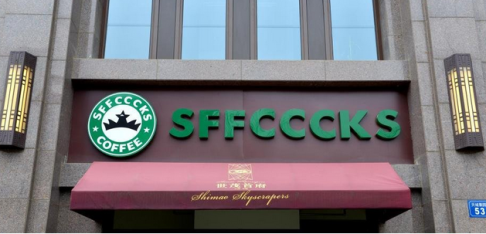
It looks like Starbucks from a distance, but upon closer inspection, something is very off here. Photo: Chinanews.com
An entire "street of fakes" popped up in the southern mainland city Wuxi in 2014, featuring placeholder signs with modified names of well-known international brands. The most eye-catching sign, which quickly went viral online for its unconventional name, was "Sffcccks Coffee".
Fake iWatches
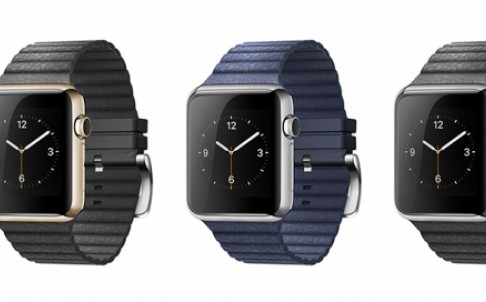
The Zeaplus Watch strongly resembles the Apple Watch. Photo: SCMP Pictures
Coming once again from Shenzhen, cheap iWatch clones hit the market right ahead of Apple's official smartwatch release in April 2015. Many of the lookalikes were made by Zeaplus and Zhimeide, two mainland companies specialising in Android-based wristwear.
Fake salt

Police found that the “fake salt” was mostly sold to smaller supermarkets and food stores, plus small restaurants in rural and suburban areas. Photo: SCMP Pictures
A ring of counterfeiters were doing big business last month until local authorities seized 20,000 tones of industrial grade salt that was being sold as regular table salt throughout Beijing, Henan, Shandong, Jiangsu, Anhui, Hebei and Tianjin. Over twenty suspects were arrested.
Fake blood
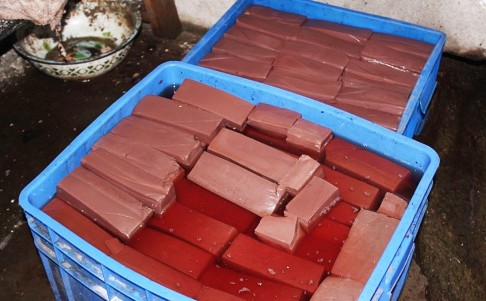
Congealed blood made by the suspect. Photo: SCMP Pictures
Even blood cannot escape Chinese counterfeiting! In early July, Shaanxi authorities discovered that a man was adding formaldehyde to barrels of congealed blood and selling the mixture as a gourmet delicacy. Traditionally, congealed duck blood is consumed all across China, but the culprit used cheaper cow and sheep's blood instead of the real deal.
Fake Air Jordans
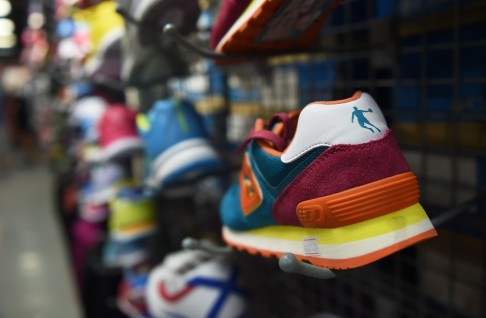
Qiodan shoes featuring a logo similar to Jordan's 'Jumpman'. Photo: AFP
In late July, American basketball superstar Michael Jordan lost a case against Qiaodan Sports, a Chinese company that produces goods featuring the image of a jumping basketball player - heavily reminiscent of the logo used by Jordan on his Nike Air Jordan sneakers.
Fake police station

Officers found police uniforms, handcuffs and stun guns, among other items in his home. Photo: Rmrbapi.people.cn
A man in Wuhan, Hubei province, took the phrase "take the law into your own hands" one step too far when he turned his home into a fake police station, where scammed money from people in trouble. The house came complete with an "interrogation room" and law enforcement gear like uniforms, stun guns and handcuffs. His ruse unravelled when a disgruntled ex-girlfriend reported him to the real police.
Fake weed
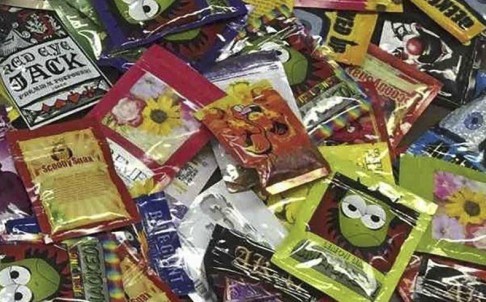
Seized "fake weed", which sometimes goes by many names - including K2, Spice, Bizarro, Scooby Snax, Kryp2nite and Stoopid. Photo: AP
Most recently, synthetic marijuana imported to the United States from China has caused a ruckus with American health officials. While the drug resembles real pot, it has been known to deliver a lethal high from chemical compounds that can also cause panic attacks and psychotic hallucinations.
Fake Apple store
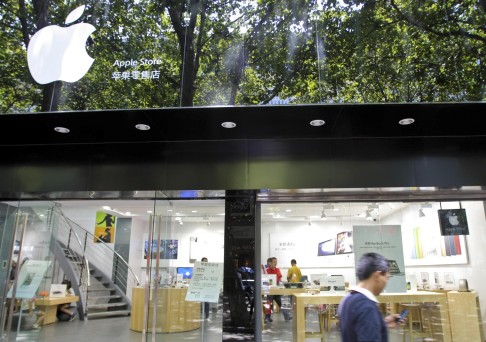
The fake Apple store nearly fooled everyone, except an eagle-eyed expat who wrote about it on her blog. Photo: Reuters
A fake Apple Store was discovered to be operating in Kunming in 2011 - a store so flawlessly Apple-like, as a Reuters report described it, that even its employees believed it was the real deal. The shop was brought to the world's attention by an American blogger living in the Chinese city. It had all the details - the logo, wooden tables and cheery staff. What gave it away, however, were the substandard furnishings (upon closer inspection) and thespelling mistake in the shop's sign: "Apple Stoer." Chinese authorities eventually found 22 fake Apple shops operating in the city and shut them all down.
Đầu tư Chứng khoán
Nhái cả Goldman Sachs, Trung Quốc đẩy công nghệ “đạo, nhái” lên đỉnh cao
Thứ Sáu, 28/8/2015 10:31

Logo của Goldman Sachs thật!
(ĐTCK) Sau hàng loạt cửa hàng Apple giả, Ikea giả tại Trung Quốc, giờ đây, một trong những ngân hàng lớn nhất thế giới Goldman Sachs trở thành nạn nhân mới nhất của nạn “đạo, nhái” tại quốc gia này.
Goldman Sachs (Shenzhen) Financial Leasing Co là một công ty dịch vụ tài chính có trụ sở tại Thẩm Quyến, thành phố phía Nam Trung Quốc. Công ty này không chỉ sử dụng tên “Goldman Sachs” và dùng một logo tương tự mà còn sử dụng luôn tên tiếng Trung “Gao Sheng” của ngân hàng này.
Vụ việc này được phơi bày bởi sự can thiệp của IUOE, một ủy ban thương mại của Mỹ đang có chiến dịch chống lại các hoạt động tham nhũng tại Ma Cao.
Mặc dù chính phủ Trung Quốc liên tục lặp lại các thông điệp mong muốn bảo vệ quyền sở hữu trí tuệ nhưng các biện pháp và quy định luật pháp vẫn hết sức lỏng lẻo với vấn đề này. Chính vì vậy, chuyện các thương hiệu nổi tiếng bị “làm giả”, bị bắt chước là điều không hiếm gặp tại nền kinh tế lớn thứ hai thế giới này.
Có rất nhiều các nhà máy, xưởng sản xuất tại Thẩm Quyến và các khu vực xung quanh các khu công nghiệp đang sản xuất đủ loại hàng giả, từ túi xách tay, điện thoại di động cho tới xe hơi.
Người phát ngôn của Golman Sachs cho biết, không có bất kỳ mối liên hệ nào giữa Ngân hàng với công ty tại Thẩm Quyến này và họ đang “xem xét vấn đề” một cách nghiêm túc.
Trước đó, cũng trong tháng 8/2015, giới chức Trung Quốc cũng phát hiện một vụ tương tự, khi một ngân hàng tại tỉnh Sơn Đông đã “nhái” theo Ngân hàng Xây dựng Trung Quốc, nhà băng lớn thứ hai trên thế giới dựa trên giá trị tài sản.
Vụ việc bị phát hiện sau khi một người phụ nữ tại địa phương gửi 40.000 nhân dân tệ (6.200 USD) vào ngân hàng “nhái” này và không thể rút tiền ra tại chi nhánh của Ngân hàng Xây dựng Trung Quốc thật.
Lam Phong (Theo Financial Times)



No comments:
Post a Comment